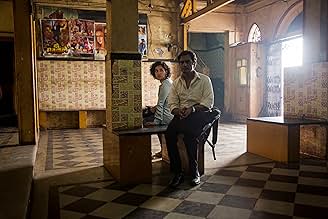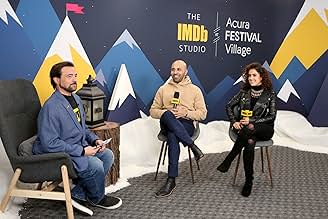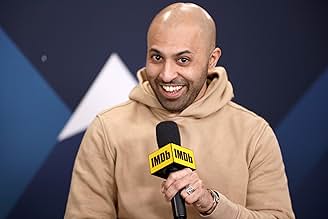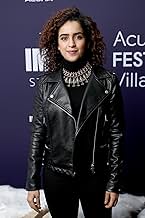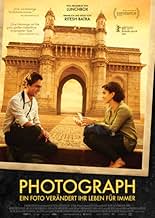IMDb RATING
6.8/10
6.4K
YOUR RATING
A struggling street photographer in Mumbai, pressured to marry by his grandmother, convinces a shy stranger to pose as his fiancée. The pair develop a connection that transforms them in ways... Read allA struggling street photographer in Mumbai, pressured to marry by his grandmother, convinces a shy stranger to pose as his fiancée. The pair develop a connection that transforms them in ways they could not expect.A struggling street photographer in Mumbai, pressured to marry by his grandmother, convinces a shy stranger to pose as his fiancée. The pair develop a connection that transforms them in ways they could not expect.
- Awards
- 3 wins & 11 nominations total
Sahaarsh Shuklaa
- Zakir Bhai
- (as Saharsh Kumar Shukla)
Shriidhar Dubey
- Raghu
- (as Shree Dhar Dubey)
- Director
- Writer
- All cast & crew
- Production, box office & more at IMDbPro
Featured reviews
A photograph captures a split second. A series of photographs becomes a motion picture and tells a story.
The story that director-writer Ritesh Batra tells in "Photograph" is of a street photographer, Rafi (Nawazuyddin Siddique) in Mumbai, India's most populous city. He hawks his service to anyone who'll pay 50 rupees. One day he approaches a young woman (a mousy Sanya Malhotra) and offers her a cut-rate price. He snaps her and produces her portrait from his portable printer, but she's called away before he can complete the transaction.
On the way to his flat, which he shares with three or four other bachelors, he hears that his grandmother is not taking her medications because he hasn't found a girl to marry. So he sends his grandmother, Dadi, a copy of the woman's photo, claiming that she is his girlfriend. Dadi, who lives in a village several hundred miles away, notifies Rafi that she is on the way to check things out.
How can Rafi find the girl in a city of 20 million? Fortunately a photo resolves the problem. A billboard advertising an accounting school shows the young women, Miloni, as its top student. By persistently taking a bus that picks up people near the school, Rafi meets Miloni and persuades her to pretend to be his girlfriend as long as Dadi is in town. For various reasons, including that she can no longer abide her parents making decisions for her (even telling her what her preferred color is), Miloni agrees.
Dadi (a scene-stealing Farrukh Jaffar) arrives and starts asking questions about Miloni, whom she knows as Noorie, the name Rafi made up for his "girlfriend." Rafi and Miloni devise their backstory, and Dadi seems satisfied--or is she? Meanwhile, Miloni's parents have other plans for her.
"Photograph" takes the viewer all over Mumbai--from its squalor to its middle-class neighborhoods, which is where Miloni resides. Her family can afford to send her to the United States with a potential bridegroom who has difficulty controlling his weight. Rafi, on the other hand, is struggling to pay off the debts of his late father.
The film could use some judicious editing. A taxi scene with Rafi arguing with the driver seems out of place. And it takes awhile before you can tell that Rafi and Miloni actually have more than just a tentative connection.
"Photograph" has an unexpected ending. Yet it appropriately bookends its opening. Remember this is a motion picture, not just a photograph.
The story that director-writer Ritesh Batra tells in "Photograph" is of a street photographer, Rafi (Nawazuyddin Siddique) in Mumbai, India's most populous city. He hawks his service to anyone who'll pay 50 rupees. One day he approaches a young woman (a mousy Sanya Malhotra) and offers her a cut-rate price. He snaps her and produces her portrait from his portable printer, but she's called away before he can complete the transaction.
On the way to his flat, which he shares with three or four other bachelors, he hears that his grandmother is not taking her medications because he hasn't found a girl to marry. So he sends his grandmother, Dadi, a copy of the woman's photo, claiming that she is his girlfriend. Dadi, who lives in a village several hundred miles away, notifies Rafi that she is on the way to check things out.
How can Rafi find the girl in a city of 20 million? Fortunately a photo resolves the problem. A billboard advertising an accounting school shows the young women, Miloni, as its top student. By persistently taking a bus that picks up people near the school, Rafi meets Miloni and persuades her to pretend to be his girlfriend as long as Dadi is in town. For various reasons, including that she can no longer abide her parents making decisions for her (even telling her what her preferred color is), Miloni agrees.
Dadi (a scene-stealing Farrukh Jaffar) arrives and starts asking questions about Miloni, whom she knows as Noorie, the name Rafi made up for his "girlfriend." Rafi and Miloni devise their backstory, and Dadi seems satisfied--or is she? Meanwhile, Miloni's parents have other plans for her.
"Photograph" takes the viewer all over Mumbai--from its squalor to its middle-class neighborhoods, which is where Miloni resides. Her family can afford to send her to the United States with a potential bridegroom who has difficulty controlling his weight. Rafi, on the other hand, is struggling to pay off the debts of his late father.
The film could use some judicious editing. A taxi scene with Rafi arguing with the driver seems out of place. And it takes awhile before you can tell that Rafi and Miloni actually have more than just a tentative connection.
"Photograph" has an unexpected ending. Yet it appropriately bookends its opening. Remember this is a motion picture, not just a photograph.
The city's love affair with unusual encounters is an element that sets it apart, and having stayed in Mumbai for over two decades, like most other Mumbaikars, there exists a set of people, and stories, and conversations that I keep going back to.
To story of Photograph focuses on one such peculiar encounter that eventually translates into an unexpected connection. Rafique and Miloni meet by chance, and a product of that moment gives them disparate reasons to meet again. The screenplay convincingly lets the viewers comprehend the circumstances the protagonists are accustomed to through little, insignificant instances; Ritesh Batra's tendency to not be too loud and lucid replenishes the cinematic narration with a pinch of exquisiteness. The role of supporting characters is vital, because it is their expectations that largely dictate the protaganists' actions. To argue that the plot is unrealistic may not be entirely authentic, especially because almost every decision that Rafique and Miloni resort to is bolstered by the desire to divert from what is usual, to avoid what is mundane. However, if the writer compulsorily asks me to point out an element that is unrealistic, I would probably tell him that it is impossible for a CA Inter student to take out time for such lengthy hangouts.
The entire cast is spectacular. Nawazuddin Siddiqui is a natural, and it is phenomenal to witness him stick to his character throughout the run-time. Sanya Malhotra wonderfully portrays the introverted Miloni, who also harbors a quotient of curiosity. Farrukh Jafar as Dadi, and Geetanjali Kulkarni as Rampyari put up brilliant performances. Saharsh Shukla and Sachin Khedekar are impressive as well. Vijay Raaz, in an unpredictable role, is refreshing as ever. Jim Sarbh is decent. Ritesh Batra, who delivers a convincing comeback, is an artist that the industry must be proud of.
Photograph is a film that thrives on silences, and it is beautiful to acknowledge how, at times, they overcompensate for the absence of words.
To story of Photograph focuses on one such peculiar encounter that eventually translates into an unexpected connection. Rafique and Miloni meet by chance, and a product of that moment gives them disparate reasons to meet again. The screenplay convincingly lets the viewers comprehend the circumstances the protagonists are accustomed to through little, insignificant instances; Ritesh Batra's tendency to not be too loud and lucid replenishes the cinematic narration with a pinch of exquisiteness. The role of supporting characters is vital, because it is their expectations that largely dictate the protaganists' actions. To argue that the plot is unrealistic may not be entirely authentic, especially because almost every decision that Rafique and Miloni resort to is bolstered by the desire to divert from what is usual, to avoid what is mundane. However, if the writer compulsorily asks me to point out an element that is unrealistic, I would probably tell him that it is impossible for a CA Inter student to take out time for such lengthy hangouts.
The entire cast is spectacular. Nawazuddin Siddiqui is a natural, and it is phenomenal to witness him stick to his character throughout the run-time. Sanya Malhotra wonderfully portrays the introverted Miloni, who also harbors a quotient of curiosity. Farrukh Jafar as Dadi, and Geetanjali Kulkarni as Rampyari put up brilliant performances. Saharsh Shukla and Sachin Khedekar are impressive as well. Vijay Raaz, in an unpredictable role, is refreshing as ever. Jim Sarbh is decent. Ritesh Batra, who delivers a convincing comeback, is an artist that the industry must be proud of.
Photograph is a film that thrives on silences, and it is beautiful to acknowledge how, at times, they overcompensate for the absence of words.
This is a "sweet" film well worth your time, but I couldn't get the age difference between the two main characters out of my head. And as sweet as it was, what would be the chance of any sort of long term relationship be between those two? I mean, realistically, back to the village? And how does he get to take so much time off from work, at 30 rupees per picture? Oh yeah, and when I was there in January 2019 MY photos cost 100 rupees each. Thank goodness I'm not a woman, lest I have to pay the combined white and pink taxes. OK, it's not about me, nice film. The silences were not a distraction, but an enhancement. The supporting cast was quite good too.
After being impressed by Ritesh Batra's Lunchbox and his style of cinema, I knew that this man is going to have something unique in his every movie. The movie stars Nawazuddin Siddiqui, Sanya Malhotra and Farrukh Jaffar in major roles. I don't think that the casting could have been better. One thing about the cast though
-I personally found Jim Sarbh's role a little insignificant for an acclaimed actor like him.
Regarding characters, Nawaz was not disappointing with his acting and did what he always does, an above average justice to his character. I consider Miloni's (Sanya Malhotra) character to be the best written amongst all and also well executed by her. The one actor who took her character on another level only with her acting was Farrukh Jaffar. It was a treat to watch her. Until her, I could never believe someone acting beside Nawaz subjugating him. If there has to be a single reason to watch this movie, it is her acting and her comic timing and dialogue delivery.
The story doesn't droop on a classic romance, instead shows a story between a struggling road-side photographer and a CA student from an upper-middle class Gujarati family, two completely different worlds. The story shows how sometimes people can want only so much from life and yet that can be completely different for different people. Ritesh Batra is known for developing characters that are relatable to a mass somehow, and this time too, he created such character, Miloni. She is a soft-spoken, a yes-girl who has no opinions of her own, who is pulled from her dream of becoming an actor and peer pressured into doing CA. A lot out there, right? I also liked how smartly Batra ended the movie. Ben Kutchins did a great job with his cinematography showing beautifully the slums and the fast-running city together. Some stills from the movie were really outstanding. In all, this movie is not a Masala Romantic, but is appealing in its own way.
There can be only two reasons to not have liked this movie. One, somehow the detailings to the characters were incomplete and second, the movie was bit slow at a few places. Had it not been compensated by exquisite acting, the movie wouldn't have turned out to be the way it did. Otherwise, I would recommend this movie to every cinema lover who understands Batra's poetic and eccentric film-making skill.
I would say the intention of director was good to make a movie as good as THE LUNCHBOX but director missed this time.
It's still watchable but you will feel something is missing all the time.
Some scenes are really too much like everyone is asking why dadi has stopped taking medicine and some more.
Just watch it and don't expect much.
Did you know
- TriviaRitesh Batra's fourth film after much acclaimed Lunchbox 2013.
- SoundtracksAaja re o mere dilbar aaja
Written by Jan Nissar Akhtar
Details
Box office
- Gross US & Canada
- $344,534
- Opening weekend US & Canada
- $35,796
- May 19, 2019
- Gross worldwide
- $996,171
- Runtime1 hour 50 minutes
- Color
- Aspect ratio
- 2.35 : 1
Contribute to this page
Suggest an edit or add missing content







